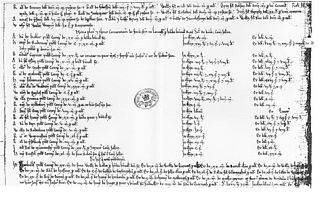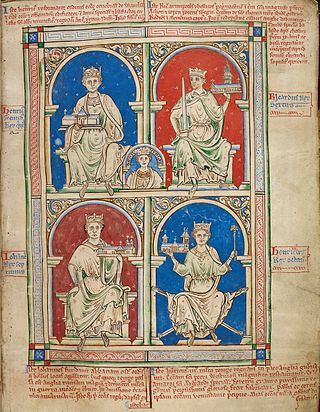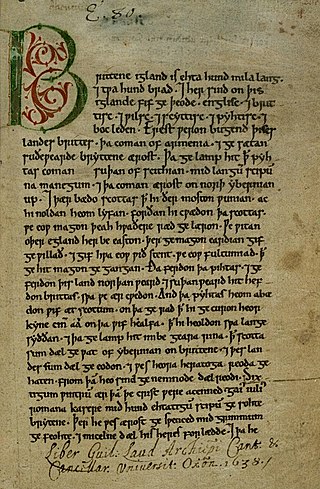Related Research Articles

Danegeld was a tax raised to pay tribute or protection money to the Viking raiders to save a land from being ravaged. It was called the geld or gafol in eleventh-century sources. It was characteristic of royal policy in both England and Francia during the ninth through eleventh centuries, collected both as tributary, to buy off the attackers, and as stipendiary, to pay the defensive forces. The term Danegeld did not appear until the late eleventh century. In Anglo-Saxon England tribute payments to the Danes was known as gafol and the levy raised to support the standing army, for the defence of the realm, was known as heregeld (army-tax).

The Anglo-Normans were the medieval ruling class in England following the Norman Conquest, and were primarily a combination of Normans, Frenchmen, Flemings, Bretons, and Anglo-Saxons. A small number of Normans had earlier befriended future Anglo-Saxon king of England, Edward the Confessor, during his exile in his mother's homeland of Normandy in northern France. When he returned to England, some of them went with him; as such, there were Normans already settled in England prior to the conquest. Edward's successor, Harold Godwinson, was defeated by Duke William the Conqueror of Normandy at the Battle of Hastings, leading to William's accession to the English throne.

In the civil service of the United Kingdom, His Majesty's Exchequer, or just the Exchequer, is the accounting process of central government and the government's current account in the Consolidated Fund. The term is used in various financial documents, including the latest departmental and agency annual accounts.

The Kingdom of England was a sovereign state on the island of Great Britain from the early 10th century, when it emerged from various Anglo-Saxon kingdoms, until May 1, 1707, when it united with Scotland to form the Kingdom of Great Britain, which would later become the United Kingdom. The Kingdom of England was among the most powerful states in Europe during the medieval and early modern colonial periods.
The Charter of Liberties, also called the Coronation Charter, or Statutes of the Realm, was a written proclamation by Henry I of England, issued upon his accession to the throne in 1100. It sought to bind the King to certain laws regarding the treatment of nobles, church officials, and individuals. The nineteenth-century historians Frederick Maitland and Frederick Pollock considered it a landmark document in English legal history and a forerunner of Magna Carta.
Frankpledge was a system of joint suretyship common in England throughout the Early Middle Ages and High Middle Ages. The essential characteristic was the compulsory sharing of responsibility among persons connected in tithings. This unit, under a leader known as the chief-pledge or tithing-man, was then responsible for producing any man of that tithing suspected of a crime. If the man did not appear, the entire group could be fined.

Anglo-Saxon law is a body of written rules and customs that were in place during the Anglo-Saxon period in England, before the Norman conquest. This body of law, along with early Medieval Scandinavian law and Germanic law, descended from a family of ancient Germanic custom and legal thought. However, Anglo-Saxon law codes are distinct from other early Germanic legal statements—known as the leges barbarorum, in part because they were written in Old English instead of in Latin. The laws of the Anglo-Saxons were the second in medieval Western Europe after those of the Irish to be expressed in a language other than Latin.

The Pipe rolls, sometimes called the Great rolls or the Great Rolls of the Pipe, are a collection of financial records maintained by the English Exchequer, or Treasury, and its successors, as well as the Exchequer of Ireland. The earliest date from the 12th century, and the series extends, mostly complete, from then until 1833. They form the oldest continuous series of records concerning English governance kept by the English, British, Irish and United Kingdom governments, covering a span of about 700 years. The early medieval ones are especially useful for historical study, as they are some of the earliest financial records available from the Middle Ages. A similar set of records was developed for Normandy, which was ruled by the English kings from 1066 to 1205, but the Norman Pipe rolls have not survived in a continuous series like the English.

The Harrying of the North was a series of military campaigns waged by William the Conqueror in the winter of 1069–1070 to subjugate Northern England, where the presence of the last Wessex claimant, Edgar Ætheling, had encouraged Anglo-Saxon Northumbrian, Anglo-Scandinavian and Danish rebellions. William paid the Danes to go home, but the remaining rebels refused to meet him in battle, and he decided to starve them out by laying waste to the Northern shires using scorched earth tactics, especially in the historic county of Yorkshire and the city of York, before relieving the English aristocracy of their positions, and installing Norman aristocrats throughout the region.
Englishry or, in Old French, Englescherie, is a legal name given, in medieval England, for the status of a person as an Englishman.

The County Palatine of Durham was a jurisdiction in the North of England, within which the bishop of Durham had rights usually exclusive to the monarch. It developed from the Liberty of Durham, which emerged in the Anglo-Saxon period. The gradual acquisition of powers by the bishops led to Durham being recognised as a palatinate by the late thirteenth century, one of several such counties in England during the Middle Ages. The county palatine had its own government and institutions, which broadly mirrored those of the monarch and included several judicial courts. From the sixteenth century the palatine rights of the bishops were gradually reduced, and were finally abolished in 1836. The last palatine institution to survive was the court of chancery, which was abolished in 1972.

Nigel was an Anglo-Norman clergyman and administrator who served as Bishop of Ely from 1133 to 1169. He came from an ecclesiastical family; his uncle Roger of Salisbury was a bishop and government minister for King Henry I, and other relatives also held offices in the English Church and government. Nigel owed his advancement to his uncle, as did Nigel's probable brother Alexander, who like Nigel was advanced to episcopal status. Nigel was educated on the continent before becoming a royal administrator. He served as Treasurer of England under King Henry, before being appointed to the see, or bishopric, of Ely in 1133. His tenure was marked by conflicts with the monks of his cathedral chapter, who believed that Nigel kept income for himself that should properly have gone to them.
Carucage was a medieval English land tax enacted by King Richard I in 1194, based on the size—variously calculated—of the taxpayer's estate. It was a replacement for the danegeld, last imposed in 1162, which had become difficult to collect because of an increasing number of exemptions. Carucage was levied just six times: by Richard in 1194 and 1198; by John, his brother and successor, in 1200; and by John's son, Henry III, in 1217, 1220, and 1224, after which it was replaced by taxes on income and personal property.
Henry Royston Loyn, FBA, was a British historian specialising in the history of Anglo-Saxon England. His eminence in his field made him a natural candidate to run the Sylloge of the Coins of the British Isles, which he chaired from 1979 to 1993. He was Professor of Medieval History in the University College of South Wales and Monmouthshire and afterwards Professor of Medieval History at Westfield College in the University of London.

In the history of England, the High Middle Ages spanned the period from the Norman Conquest in 1066 to the death of King John, considered by some historians to be the last Angevin king of England, in 1216. A disputed succession and victory at the Battle of Hastings led to the conquest of England by William of Normandy in 1066. This linked the Kingdom of England with Norman possessions in the Kingdom of France and brought a new aristocracy to the country that dominated landholding, government and the church. They brought with them the French language and maintained their rule through a system of castles and the introduction of a feudal system of landholding. By the time of William's death in 1087, England formed the largest part of an Anglo-Norman empire, ruled by nobles with landholdings across England, Normandy and Wales. William's sons disputed succession to his lands, with William II emerging as ruler of England and much of Normandy. On his death in 1100 his younger brother claimed the throne as Henry I and defeated his brother Robert to reunite England and Normandy. Henry was a ruthless yet effective king, but after the death of his only male heir William Adelin, he persuaded his barons to recognise his daughter Matilda as heir. When Henry died in 1135 her cousin Stephen of Blois had himself proclaimed king, leading to a civil war known as The Anarchy. Eventually Stephen recognised Matilda's son Henry as his heir and when Stephen died in 1154, he succeeded as Henry II.

The title Leges Edwardi Confessoris, or Laws of Edward the Confessor, refers to a collection of laws, purporting to represent English law in the time of Edward the Confessor, as recited to the Norman invader king William I in 1070, but which was not composed until probably the early years of the reign of King Stephen.
The Leges Henrici Primi or Laws of Henry I is a legal treatise, written in about 1115, that records the legal customs of medieval England in the reign of King Henry I of England. Although it is not an official document, it was written by someone apparently associated with the royal administration. It lists and explains the laws, and includes explanations of how to conduct legal proceedings. Although its title implies that these laws were issued by King Henry, it lists laws issued by earlier monarchs that were still in force in Henry's reign; the only law of Henry that is included is the coronation charter he issued at the start of his reign. It covers a diverse range of subjects, including ecclesiastical cases, treason, murder, theft, feuds, assessment of danegeld, and the amounts of judicial fines.

Taxation in medieval England was the system of raising money for royal and governmental expenses. During the Anglo-Saxon period, the main forms of taxation were land taxes, although custom duties and fees to mint coins were also imposed. The most important tax of the late Anglo-Saxon period was the geld, a land tax first regularly collected in 1012 to pay for mercenaries. After the Norman Conquest of England in 1066, the geld continued to be collected until 1162, but it was eventually replaced with taxes on personal property and income.

Feudalism as practiced in the Kingdoms of England during the medieval period was a state of human society that organized political and military leadership and force around a stratified formal structure based on land tenure. As a military defence and socio-economic paradigm designed to direct the wealth of the land to the king while it levied military troops to his causes, feudal society was ordered around relationships derived from the holding of land. Such landholdings are termed fiefdoms, traders, fiefs, or fees.

From the Norman Conquest of 1066 to the death of King John in 1216, England was governed by the Norman and Angevin dynasties. The Norman kings preserved and built upon the institutions of Anglo-Saxon government. They also introduced new institutions, in particular, feudalism. For later developments in English government, see Government in late medieval England.
References
- ↑ Merriam-Webster dictionary
- ↑ Johnson, Charles, ed. (1950), De Necessariis Observantiis Scaccarii Dialogus qui vulgo dicitur Dialogus de Scaccario, London: Thomas Nelson & Sons, pp. 52–53, OCLC 63081916 quoted in Warren, W. L. (1987), The Governance of Norman and Angevin England, 1086–1272 , The Governance of England, vol. 2, Stanford, CA, US: Stanford University Press, p. 60, ISBN 0-8047-1307-3 .
- ↑ Warren 1987, p. 60.
- ↑ Henry I, King of England: Grant of Tax Liberties to London, 1133, Medieval Sourcebook, Fordham University